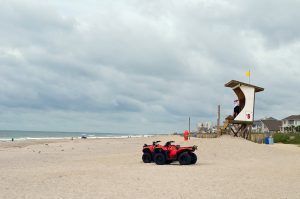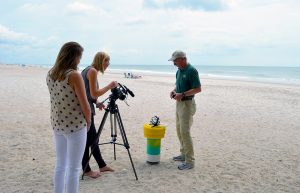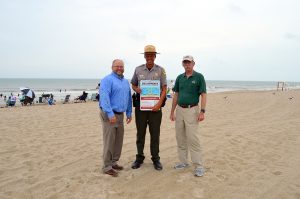Posted June 13, 2016
Every day spent at the beach has the potential for creating great fun and lasting memories — as well as for risk.

Lifeguards with Wrightsville Beach Ocean Rescue prepare for possible rip currents as Tropical Storm Colin threatens the coast in June 2016.
Beautiful blue waves crashing onshore delight and thrill us. But under the right conditions, those same waves can form dangerous rip currents, strong channels of fast-moving water that can overpower even the best of swimmers, dragging them far from shore.
In 2015, 42 people died from rip currents across the country, including one in North Carolina. Rip currents generally account for over 80 percent of rescues performed by beach lifeguards.
“Rip currents do not discriminate,” warns Dave Baker, director of the Wrightsville Beach Ocean Rescue squad. He advises anyone caught in a current to stay calm and swim parallel to the beach, allowing the waves outside the current to push the swimmer back to shore.
Baker shared his knowledge of rip current safety with local media to kick off North Carolina’s Rip Current Awareness Week, June 5 to June 11, 2016. North Carolina Sea Grant teamed up with meteorologists at the National Weather Service’s Wilmington Office to host the event and spread awareness of rip current hazards at North Carolina beaches.

Reporters with WWAY talk to Spencer Rogers, North Carolina Sea Grant coastal construction and erosion specialist, about how he deploys drifters to better understand rip current formation and behavior.
In an interview with WWAY, Sandy LaCorte, a meteorologist with NWS in Wilmington, explains that rip currents can happen in good and bad weather. NWS forecasts rip currents and works closely with lifeguards to ground truth surf conditions. LaCorte notes that, “as conditions change throughout the day, you may see different flags go up at the beach, where they may have increased the risk for the day.”
NWS also works with Sea Grant to understand how rip currents form and behave in order to improve forecasting and outreach. Spencer Rogers, Sea Grant coastal construction and erosion specialist, leads a team documenting the velocity, circulation and ejection frequency of East Coast rip currents using specially designed data-logging drifters.
Using the drifters, researchers have observed circulation cells in the rip currents that could influence how lifeguards approach a rescue. When faced with multiple rescues, lifeguards can focus on keeping people calm and attending to those in the most trouble, if they know that the whole group may be recirculated back to shore, explains Rogers in a 2015 Coastwatch article.

Meteorologist Steve Pfaff presents Jeffrey Owen, superintendent of Fort Fisher State Recreation Area, with a new rip current safety sign along with North Carolina Sea Grant’s Spencer Rogers in celebration of Rip Current Awareness Week and the North Carolina State Park’s Centennial.
The next step in efforts to increase beach safety is figuring out how to spread the message on rip current safety, emphasizes Rogers. Along with Steven Pfaff, another meteorologist with NWS Wilmington, Rogers presented Fort Fisher State Recreation Area with a new “Break the Grip of the Rip” sign in celebration of Rip Current Awareness Week and the North Carolina State Park’s Centennial.
Awareness events and signs on beaches — in both English and Spanish — reach audiences year-round, but individuals also can take additional steps to stay safe. “Talk to your local lifeguard when enjoying the beach this summer and always look out for your fellow friends and family while participating in water activity,” Rogers adds.
For more safety tips and information, visit Sea Grant’s rip current page and ripcurrents.noaa.gov.